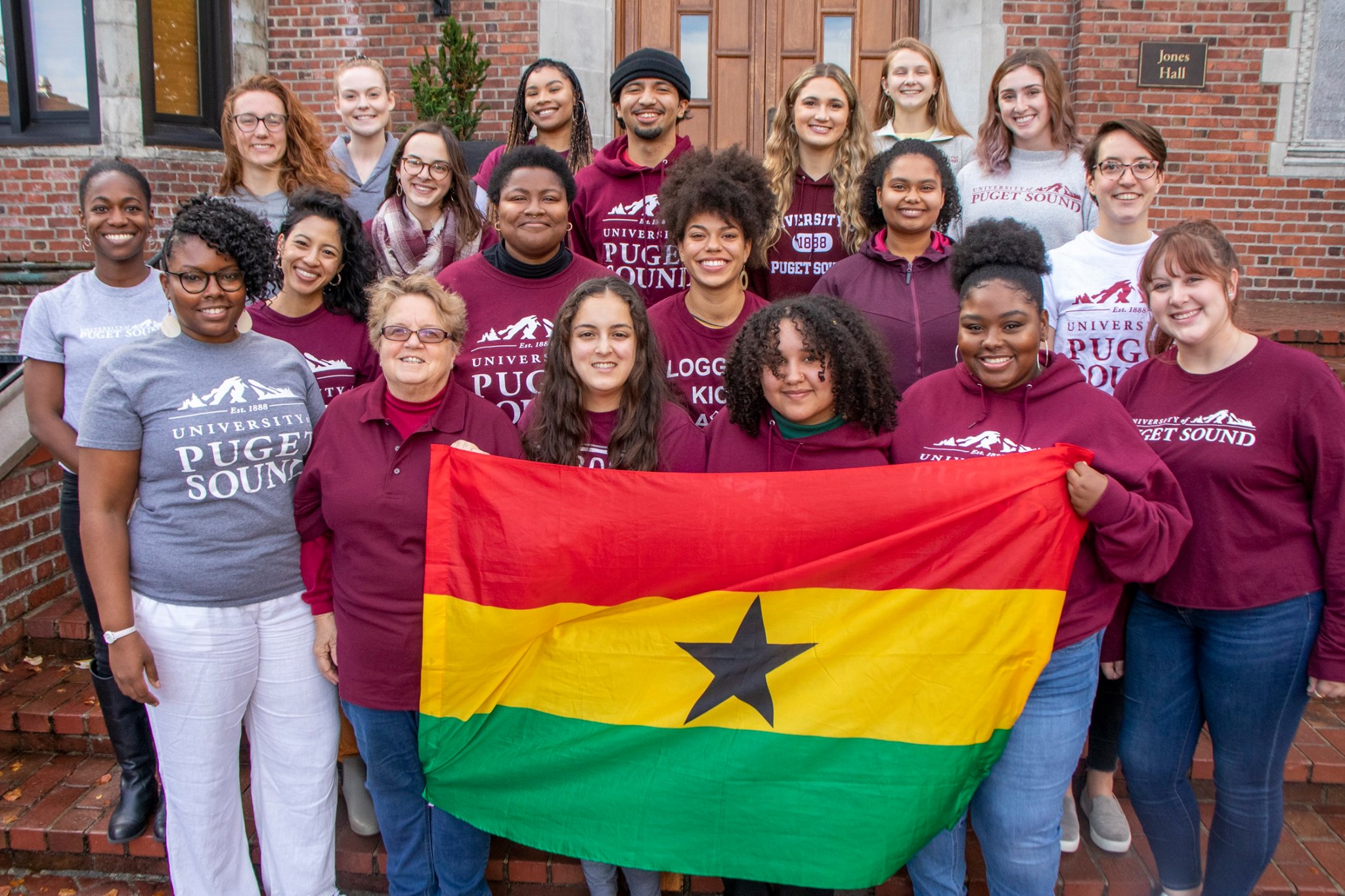
By Alex Dyson
In winter of 2019-2020, African American Studies class 310, led by Dr. LaToya Brackett, travelled to Ghana for a two week study tour. Blake Bouligny, Jo Gudgell, and Dr. Brackett reflect on their experiences.
Blake Bouligny (‘20), majoring in Business Administration with a minor African American Studies.
AD: Why did you choose to pursue an AFAM minor?
BB: I felt like it was just in me to do it. There aren’t a lot of Black students on campus, and I wanted to be a representative of the Black students in the AFAM classes. I also just felt like, growing up, I didn’t learn a lot of Black history, and that taking these classes would help me understand and learn more about my culture. I just wished that I had a better foundation going into AFAM classes before I took them. So that’s pretty much why. It just always felt like a great space for me, and somewhere where I could connect to other people.
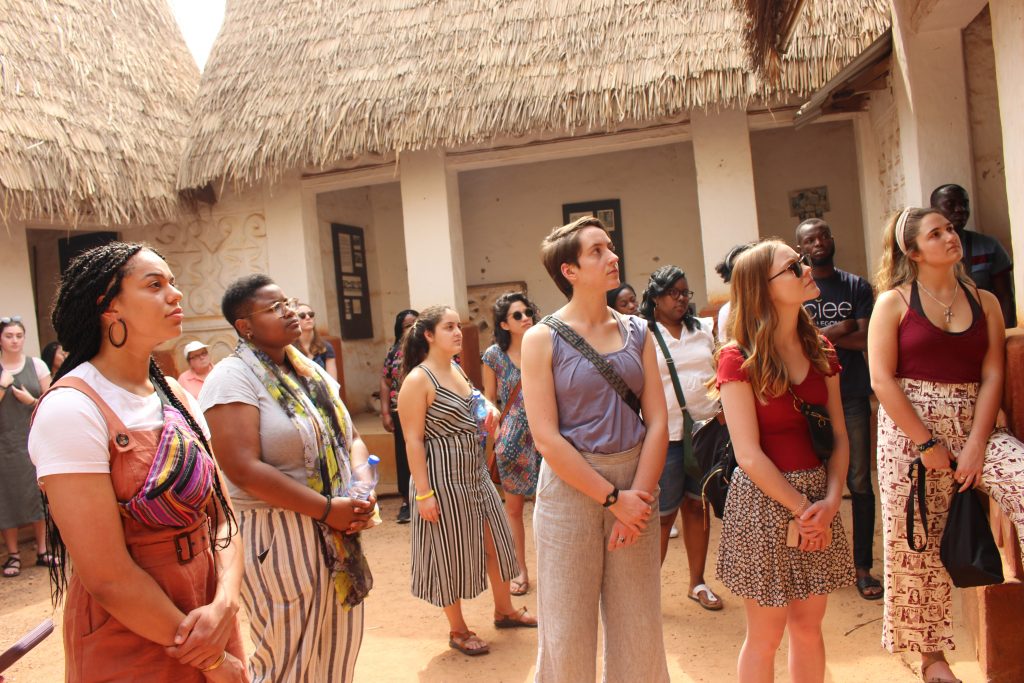
AD: What exactly is an AFAM class? What differentiates AFAM, what makes it unique as a discipline?
BB: I mean, what doesn’t make AFAM unique? Professors set the curriculum, and I don’t think that their curriculums are like other curriculums, you know? In these classes, you have true discussion, whereas I think in other classes, it’s kind of like, responding to what your professors are saying, or asking questions. In here it’s a dialogue. You are having a full on conversation with your professor, your classmates. They assess your knowledge a lot differently than other classes do.
It’s also not just textbook based. I’ve done films, I’ve watched a lot of short clips, news reports. It’s a lot of investigation. There’s always something new. I feel like with other courses, or departments, there’s always an abrupt stop to where you just kind of, like, end. But with AFAM, you just keep going, and you’re really diving into the unknown-ness. It’s a different world once you’re there. I also think that professors really take the time to get to know who you are, know your name and know your background, before they dive into what they want to teach.
AD: What’s it like to do AFAM on a trip to Ghana?
BB: Wow. Honestly, I kind of forgot that it was a class. I think we had so much fun that everything just kind of became second nature. It’s one thing to take a class and sit in front of books in a room, then to physically be present in an African country. I just loved everything being visual and not just textual… It really helped things that I’ve learned make more sense. I saw things in ways that I probably wouldn’t have just reading a novel or something like that.
AD: What would make this trip going with an AFAM class, going with Dr. Brackett and all these students, what makes it different from the trip not being an AFAM class? Does that make sense?
BB: It does. The reason why I forgot it was a class was because we got so close during the trip that we ended up feeling more like a family and not like classmates. We had roommates and everything. Even the chaperones; I forgot the chaperones were chaperones sometimes because they were so cool and super comforting.
I think my biggest fear going into the trip was that I didn’t know anybody well enough. I think I knew, like, two or three people pretty decently before we got on the plane. I was talking to Mara, I was like, “Mara, I don’t know how this is gonna work. We don’t know anybody like that, so this is gonna be a challenge.” She was like, “No, ya this is gonna be weird.” But as time passed, I really got to see people for who they are. What their intentions are. I got to hear why they’re AFAM majors. I just really learned a lot about people, and built connections, which is why it didn’t feel like a class. But I feel like, if we all continued to stay distant from each other and not really take the time to know one another, then it probably just would have been like another class, and I probably wouldn’t have had as much fun as I did.
But there were a lot of times when it would get emotional, and people were always there. One to my left, right, front, back, everyone was there for support. So I think that’s what made it feel less like a class.
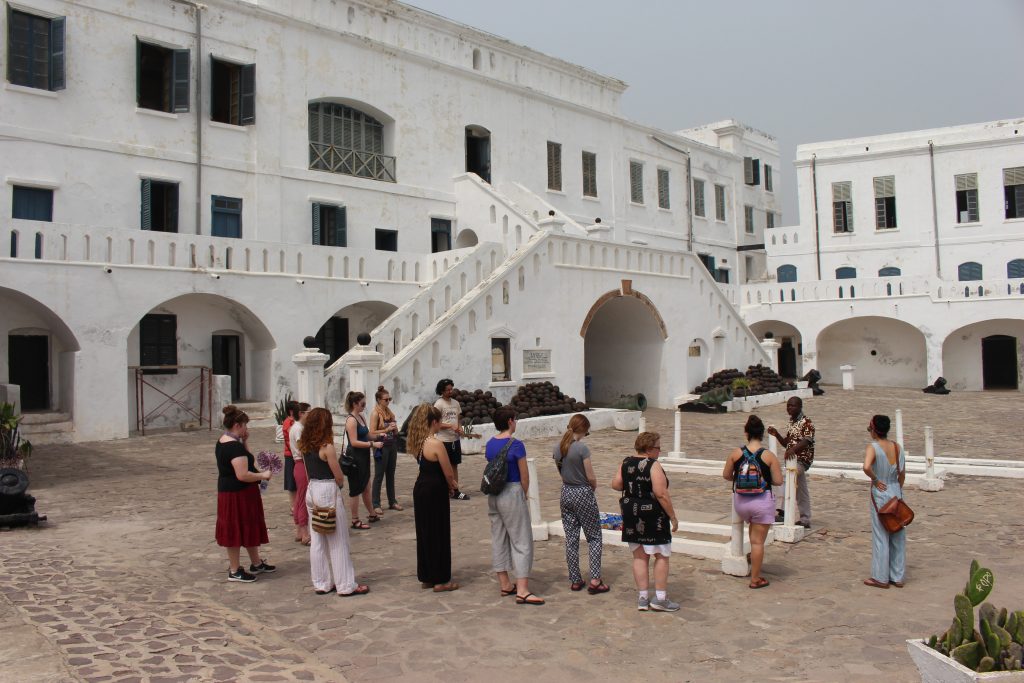
Jo Gudgell (’20) is an African American Studies major.
AD: What differentiates AFAM?
JG: I think one of the things that draws me to AFAM, in contrast with other disciplines, is how interdisciplinary it is… I’ve always been very curious about the production of knowledge and how it’s created, and why and how we take things for granted and take things to be facts…
I think that, you know, psych and soan do that in some ways, but it’s not a core part of their disciplines… it’s not inherent in the subject itself… Whereas AFAM, everything is critical. In AFAM, everything is about questioning what you know, and unlearning things you’ve been taught… I really enjoy the challenge of that.
AD: What’s an AFAM trip to Ghana like?
JG: I feel as though I’m a pretty good student. I work hard, I’m engaged, and I’m interested in what I study. But I realized when I was there (in Ghana) that having knowledge of a subject in a classroom doesn’t mean that you have that knowledge in the real world… And so I think one of the things that I learned the most from Ghana was that I still have so far to go. Being in a discipline like AFAM means that you’re never a master of it. You’re never really a scholar. You’re always seeking more knowledge and asking more questions.
One of the things that struck me the most about the trip was my own discomfort in it. That motivated me to do more work and to try to get to the root of that discomfort, why I was feeling it, and to challenge myself, and recognize that very harmful internalized dominance. To recognize that I have a lot of learning to do, not just in an academic sense, and not just in an intellectual sense, but in a deeper, more personal, more spiritual sense.
AD: What was the continuation of the course like after you returned to the US?
JG: It’s really hard when you’re in a certain setting to recognize how it’s impacting you and how your perspectives are being changed. And so that’s been an ongoing process like up until now and will continue to be long after this. When we did our research project symposium about a month after we got back, people were asking about my journey with processing the trip, and I genuinely couldn’t answer them, because I was like, I’m still processing it. Like, I don’t know what just happened. So it’s definitely been ongoing in that sense.
I think that with any experience like that, that’s so different from anything I’ve ever done, sometimes when you come back you kind of feel like it didn’t actually happen. Like it was kind of a dream. So I’ve been really actively battling that. Trying to remind myself of the reality of it, and of how I felt when I was there. Like, more tangible aspects of what I did, what I ate, how my body felt like, where we went, things like that, to just remind myself that it did happen. It’s important to recognize that in order to not negate everything that I learned…
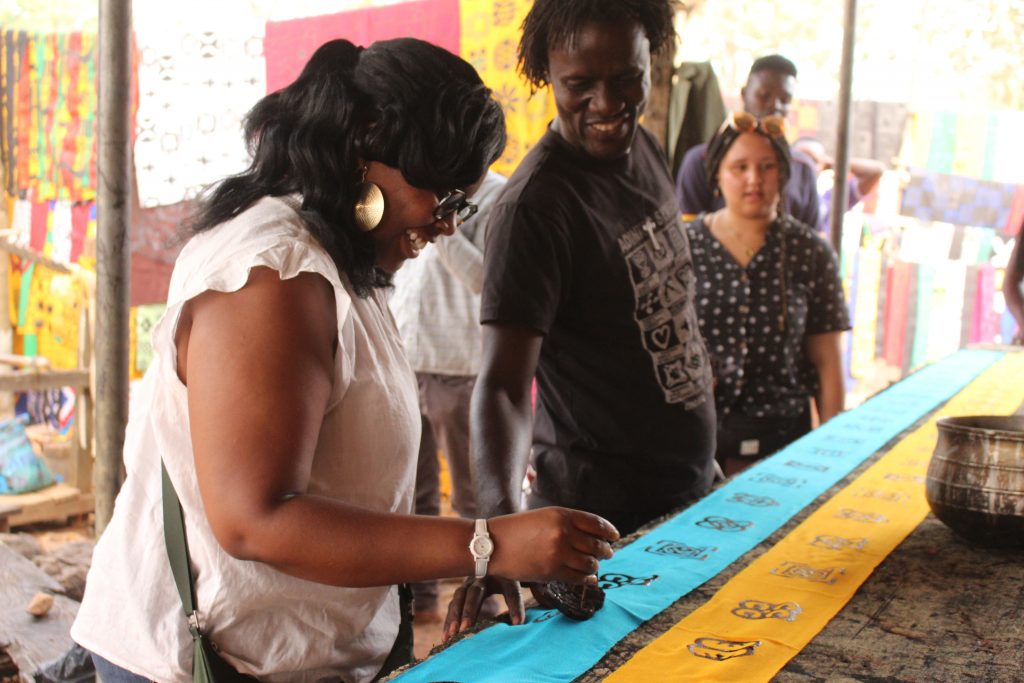
Dr. Latoya Brackett is a professor of African American Studies at Puget Sound. She led the first AFAM 310 trip to Ghana.
AD: How did the idea for AFAM 310 come about?
LB: In 2009, I went to Ghana for the first time with a study abroad at Michigan State while I was there for my PhD in African American and African Studies.
It was about 14 students, and we interned at different locations in Accra…. We visited Kumasi and we visited Cape Coast on weekends. That was really a memorable time in my life. I ended up going back to Ghana, occasionally, because of the friends that I met, connections I made, and it became a second place for me to go. After I got my PhD, it’s always been a dream of mine to take people, students in particular, to Ghana…
I wanted particularly black students to engage in this culture, because it was a really important moment for me [as an African American woman]. I knew that no matter what the moment would bring for all of my students, no matter their demographic, it would be important and it would be impactful for them.
AD: How do you prepare students in the AFAM 310 class for a trip abroad?
LB: For the whole fall semester, we meet once a week. In the class, we read novels, some West African novels in particular, and then we interrogated them. Sometimes, we had to interrogate people’s feelings and the ways that they would almost project their own ideas and ideologies onto the communities in the texts. I’d have to say, “Hey, this is not our community, and when we go, we are guests.” So we were working through some of that stuff, and working through the history. It’s not just contemporary, it’s also things that were pre-colonial and colonialist…
The reality is, you’re never going to get enough information, and you still won’t have enough information even when you’re there. So just constantly reminding them, you don’t know what’s going to happen. It’s okay to not know.
AD: What was the trip like itself?
LB: We started in Accra, then went up to Kumasi, which is one of the most culturally rich areas of Ghana, and probably West Africa… We went on campus (Kwame Nkrumah University of Science & Technology) and had a lecture about Kwame Nkrumah from a colleague of mine. Kwame Nkrumah was the first president of the first free African nation post colonialism. The people we connected with on campus, if they had not lived during Nkrumah’s time, they were the children of parents who did, they had in depth debates about him. So that was really, really cool to experience. We saw a lot of things there. … We had a former anthropology professor take us around some historical sites. We got to try making Kente cloth, and other interactive things.
Then we went to Cape Coast, where it was the most difficult for everybody because it was the slave trade that we really focused on there. Once we started doing the slave trade experiences, something that I had already intended to do based on my own experience was to have students placed in solidarity spaces. So Black students in a space and white students in a space…
I knew that I didn’t want Black students to have to be on display in a transformed white space brought from the United States, as they already are back in our AFAM classes. When they have to walk to the slave river, where potentially one of their ancestors took their last bath, I didn’t want them on display.
The reason we (create solidarity spaces is) — if someone is a person of color, they understand why we create these spaces — and such spaces are for both groups, because this means you can be honest in your feelings, no matter where you are. So, you feel the need to cry, or you don’t feel the need to cry; nobody’s looking at you to say, “Why did you cry?”, or “Why didn’t you cry?” That goes for the white students too. If white students have sadness, it’s not the same sadness the Black students have. But that doesn’t mean they can’t be sad. I don’t want them to feel watched either. So, its imperative for both groups.
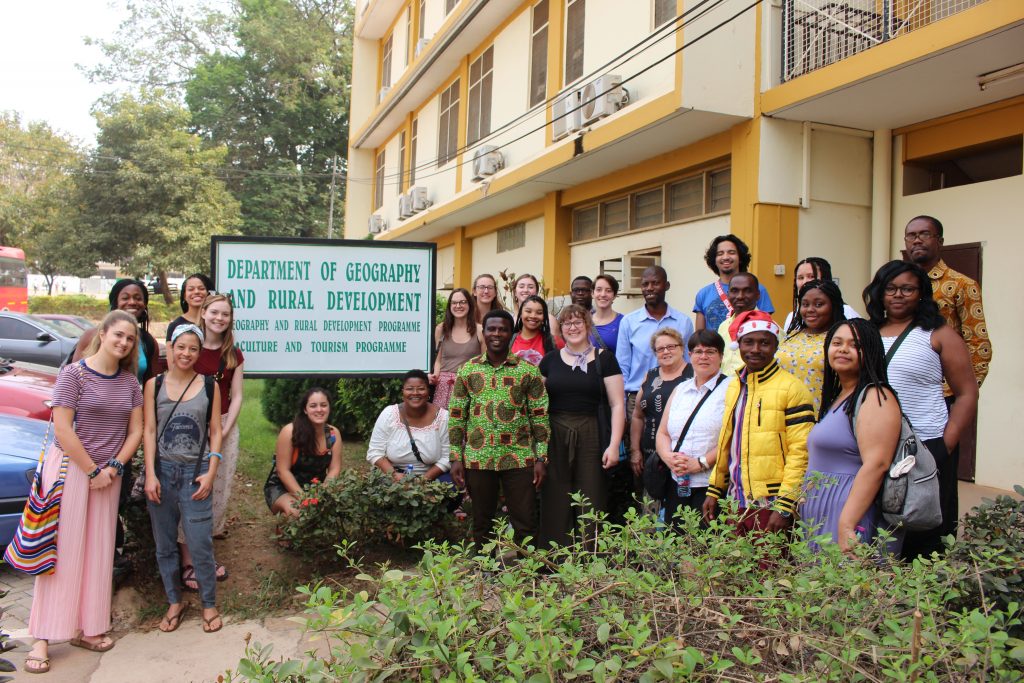
AD: What was a highlight?
LB: Small interactions with other people were highlights of the trip. A friend of mine and his wife came over and made fufu, which is a Sunday tradition, and the students got to try to make fufu and then eat it… Their little daughter was there too. Everybody really enjoyed watching their baby playing with their keys… I’m trying to get (the students) to connect with people that I know, because at the end of the day, you can go study in another country, but if you’re completely surrounded by your own people from your own country, you never really engage with it.
